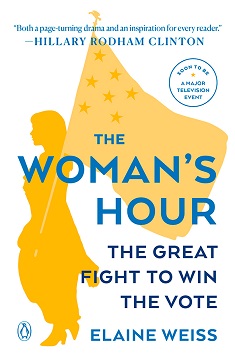April 2022 Program
Facilitators: Dr. Jill Eichhorn & Brenda Harper
When: Thursday, April 21, 4:00 p.m.
Where: Woodward Library, Room 232
 The Woman's Hour by Elaine Weiss
The Woman's Hour by Elaine Weiss
Call Number: JK1911.T2 W45 2018
ISBN: 9780525429722
Publication Date: 2018-03-06
Nashville, August 1920. It all comes down to Tennessee for the suffragists and the 19th Amendment. The opposing forces include politicians, liquor companies, railroad magnates, and a lot of racists who don't want black women voting. And then there are the "Antis"--women who fearing voting will bring about the moral collapse of the nation. They all converge in a vicious face-off replete with dirty tricks, betrayals and bribes, bigotry, Jack Daniel's, and the Bible. Following a handful of remarkable women who led their respective forces into battle, along with appearances by Woodrow Wilson, Warren Harding, Frederick Douglass, and Eleanor Roosevelt, The Woman's Hour is an inspiring story of activists winning their own freedom in one of the last campaigns forged in the shadow of the Civil War, and the beginning of the great twentieth-century battles for civil rights.
American History Q&A Program on Ratification of 19th Amendment - Interview, C-SPAN
Discussion Questions
Use the questions below to guide your reading and prepare for the session. (All discussion questions provided by the ALA.)
Why do you think anti-suffragists were so powerful? Why did they oppose votes for women?
Many stories about the suffrage movement overlook the anti-suffragists. Why do you think they do that? What do you think anti-suffragists add to this story?
What kinds of tactics did suffragists use and which ones do you think proved to be the most effective?
Which activist–suffragist or anti-suffragist–most interested you and why?
Though Tennessee ratified the Nineteenth Amendment, Weiss shows us just how close the state's representatives came to rejecting it. How does Weiss create a compelling story?
There is a television adaptation of The Woman's Hour currently in the works. What do you hope to see in a screen version of this story?